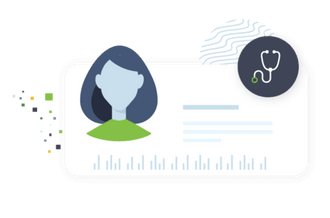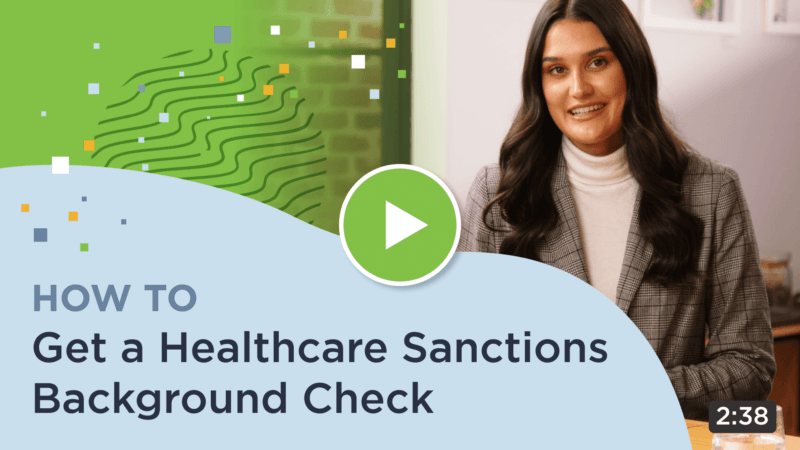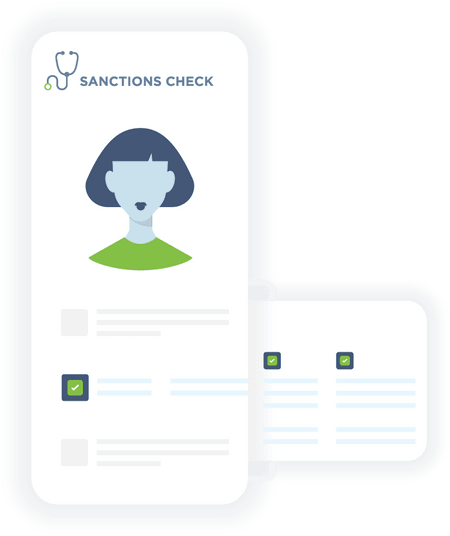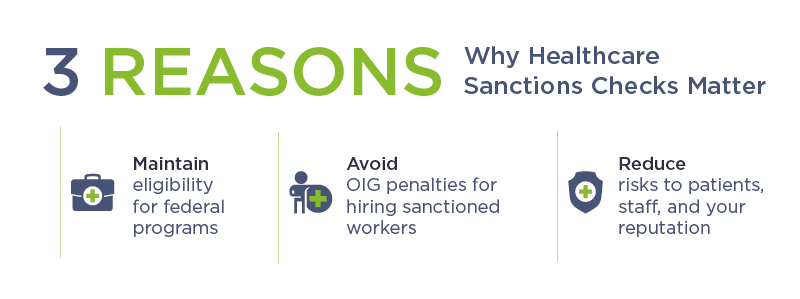Sanctions Checks
Healthcare Sanctions Check & Screening: OIG, SAM & More
Comply with federal regulations and confirm your healthcare practitioners are in good standing.
Employment Screening
What Is A Healthcare Sanctions Check?
A Healthcare Sanction Check is a screening tool for providing insight into a healthcare professional’s medical background, searching more than 1,000 government sources and lists for any penalties, suspensions, or punitive or disciplinary actions taken against a healthcare professional. These include the following lists:
- Federal HHS OIG Exclusion
- System for Award Management (SAM)
- OFAC (Office of Foreign Asset Control)
Importance
Why A Healthcare Sanctions Check Is Critical
The US Department of Health & Human Services Office of Inspector General (OIG) guidance bars healthcare organizations from hiring anyone who has been sanctioned or “excluded” from participating in federal programs such as Medicare and Medicaid. Individuals may be on the OIG Exclusion list for reasons including:
- A conviction of Medicare or Medicaid fraud
- Patient abuse or neglect
- Felony convictions for healthcare-related fraud, theft, or other financial misconduct
- Felony convictions relating to the unlawful manufacture, distribution, prescription, or dispensing of controlled substances
Trust & Safety
Why Run A Healthcare Sanctions Check?
A Healthcare Sanctions Check screens your job candidates to ensure they are in good standing and not excluded from participating in any federal healthcare program. These sanction lookups help your business:
- Maintain eligibility for Medicare, Medicaid, and other federal programs
- Avoid OIG penalties of up to $10,000 for every day the excluded individual worked
- Reduce risks to your patients, your staff, and your organization’s reputation
Results
What You’ll Learn From A Sanctions Background Check
Since many healthcare organizations are recipients of federal funding through Medicare and Medicaid, it’s important to know if HHS OIG excludes your candidates and employees from participating in these programs. A Healthcare Sanctions Check searches the OIG Exclusion list and the System for Award Management (SAM) and will alert you if your candidate is sanctioned. In addition to indicating whether the individual is on the list, you’ll also learn:
- The name of the source or board that took the disciplinary action
- Whether the sanction is currently active (or the end date if the sanction is no longer active)
- The violation or reason for the sanction (if available)
Search Options
Sanctions Background Checks Offered By GoodHire
GoodHire offers four different levels of Healthcare Sanctions Checks. Each screening search includes the OIG Exclusion List and SAM database, and each additional search level checks additional federal- and state-level sources for a more extensive search. Learn more about GoodHire’s healthcare data sources at every search level.
OIG/SAM
Healthcare Sanctions Search
SOURCES CHECKED
OIG Exclusion List & SAM *
*Ongoing Alerts: Adds monthly checks of the OIG Exclusion List & SAM
WHAT YOU’LL LEARN
If the candidate or employee is an “excluded individual” barred from participating in federally-funded healthcare programs. We’ll also let you know if no records turned up.
*Ongoing Alerts: Notifies you if an employee has been recently added as an “excluded individual”
Level 1
Healthcare Sanctions Search
SOURCES CHECKED
OIG Exclusion List & SAM
+ Federal Sources (GSA, DEA, FDA, PHS, ORI, TRICARE and OFAC-SDN data)
WHAT YOU’LL LEARN
Also checks multiple federal agency sources to report disciplinary action information.
Level 2
Healthcare Sanctions Search
SOURCES CHECKED
OIG Exclusion List & SAM
+ Federal Sources (GSA, DEA, FDA, PHS, ORI, TRICARE and OFAC-SDN data)
+ State Sources (Medicaid Exclusion lists)
WHAT YOU’LL LEARN
Includes Level 1 results, in addition to whether the candidate or employee is included on state-level Medicaid exclusion lists for reasons that may include fraud, integrity, or quality.
Level 3
Healthcare Sanctions Search
SOURCES CHECKED
OIG Exclusion List & SAM
+ Federal Sources (GSA, DEA, FDA, PHS, ORI, TRICARE and OFAC-SDN data)
+ State Sources (Medicaid Exclusion lists) + State Board Disciplinary Actions sources
+ State Abuse lists
WHAT YOU’LL LEARN
The most comprehensive healthcare sanctions search. Includes Level 1 and Level 2 results in addition to information on any individuals with disciplinary actions taken by state-level board and abuse registries.
Resources
Learn More About Sanction Checks
Compliance
FCRA & Healthcare Sanctions Background Checks
Employers using a Consumer Reporting Agency (CRA), like GoodHire, to run background checks to assess candidates during the hiring process have important responsibilities to ensure a fair and respectful process for the candidate, and to comply with various laws and regulations that govern employment screening. Learn how GoodHire’s built-in compliance features help you follow the law.
Disclosure & Authorization
The FCRA requires employers to inform the candidate that they intend to run a background check, and obtain the candidate’s permission to do so.
Adverse Action
If the results of a background check prompt a decision to deny employment, the FCRA requires employers to follow specific adverse action steps.
When & Why To Use Sanctions Checks
For employers and job applicants in the healthcare field and in other regulated industries, a sanctions check is a critical step in the hiring process. Ensuring that job candidates and employees are not listed in any of several government employment-ban lists is more than a good idea—depending on your business, it may be the law.
Violating these exclusion rules can bring hefty fines and even lengthy jail sentences. And while the feds provide free tools to help companies comply with its requirements, using them can be tricky, and even risky for all non-expert users.
This article will provide an overview of what healthcare sanctions checks are, and tips on how to navigate them.
Healthcare Sanctions Check: Medical Exclusions
The US Department of Health and Human Service Office of the Inspector General (OIG) maintains a list of individuals who are excluded from participation in federal and state healthcare programs—it’s called the OIG Exclusions list. Healthcare organizations that provide care to patients who receive benefits under these programs, such as Medicare and Medicaid, are prohibited from employing sanctioned or excluded individuals or vendors who are included on the OIG Exclusions list (also known as the healthcare sanctions list).
- Making fraudulent Medicare or Medicaid claims
- Committing other forms of healthcare fraud
- Neglecting or abusing patients, or other patient-related medical misconduct
- Theft, financial fraud, or illegal distribution of controlled substances
The amount of time an individual’s name stays on the healthcare sanctions list varies according to the nature of the sanctions against them. Some criminal convictions require staying on the list for specific durations (for example, five or 10 years). In cases of suspended or revoked licenses, individuals can request to be removed from the list once their licenses have been restored. Removal from the list is never automatic; in all instances, listed persons must formally ask to have their names taken off the list—a process the OIG calls reinstatement.
Using The OIG Sanctions Database
The OIG’s sanctions database is open to the public and searchable from any web browser. Entering the name of a company or individual into the database allows searching for listed exclusions. Matching results can be verified by entering a Social Security number (or employer ID number in the case of companies and contractors).
A word of caution: While the free OIG sanctions search tool is useful for job candidates who may be concerned they’re on the exclusions list, it’s less reliable for employers looking to hiring workers for healthcare-related positions. Social Security numbers are not available for every entry in the exclusions list, so verification is not always possible—and a candidate intent on skirting the system could always supply a bogus Social Security number.
Healthcare Sanctions Screenings In The Hiring Process
Aside from avoiding hiring persons with criminal histories or questionable credentials, there are strong financial reasons to avoid overlooking required healthcare exclusions.
The OIG can impose fines (known as civil monetary penalties, or CMPs) of $10,000 per violation on companies that hire or do business with persons on the sanctions list.
And there are risks to being overly cautious about exclusions, as well: Common names may yield multiple matches in the system, and refusing to hire a candidate based on a misidentification could be grounds for an anti-discrimination lawsuit.
Sanctions Searches As Part Of A Background Check
Healthcare sanctions searches are an important part of a comprehensive background check. Combining a sanctions search with Social Security number verification and other crosschecks can prevent the kinds of misidentification that may occur when an OIG sanctions search is the only screen used.
Many healthcare employers opt to extend their sanctions checks beyond the minimum required by federal law, looking beyond the OIG Exclusion list for professional sanctions and convictions at the state level. GoodHire takes the following three-tiered approach, which is similar to the Fraud and Abuse Control Information System (FACIS) searches used by many professional background check companies.
Level 1 Search
In addition to an OIG database search, a Level 1 search uncovers infractions, including license suspensions, recorded in dozens of other federal databases, such as those maintained by the Veteran’s Administration, Food and Drug Administration, and Department of Homeland Security.
Level 2 Search
A Level 2 search expands on a Level 1 check by searching databases maintained by 38 states, listing individuals that have been excluded from Medicaid coverage and their grounds for doing so. A Level 2 search also includes states’ lists of individuals who are ineligible for Medicare coverage because they voluntarily opted out of the program.
Level 3 Search
A Level 3 search encompasses everything included in a Level 2 search, but also searches the medical-board records in states that permit it, uncovering any disciplinary actions against a candidate, and also searches additional state-level abuse databases.
A Note About Financial Services & Global Sanctions Checks
The Patriot Act legislation, passed in the aftermath of the 9/11 attacks, includes provisions to take steps for preventing suspected terrorists and enemy states from abusing US funds. To that end, the Office of Foreign Asset Control (OFAC), a branch of the US Treasury Department, maintains a database of individuals and organizations barred from conducting business with US companies. The rules also forbid US companies from hiring individuals on the OFAC sanctions list.
Like the OIG sanctions list, OFAC’s database is available for public use on the web, but it’s more complicated than the OIG tool—and penalties for misusing it are more severe as well.
OFAC violations, which encompass crimes such as arms smuggling and money laundering along with hiring unauthorized individuals, can command penalties as high as $1 million and jail sentences of up to 20 years.
Some background check providers, including GoodHire, include OFAC sanctions searches in its Standard criminal background check package. If a candidate turns up on an OFAC screen, the screening report will provide that information, and provide the candidate with an opportunity to explain the conviction.
Start Your Sanctions Search With GoodHire Today
The logic behind healthcare sanctions searches is easy for hiring managers to understand, but the details of conducting them are tricky, despite the availability of public databases. For many hiring managers, it makes sense to trust the process to experts in employment screening and compliance with fair-hiring regulations.
GoodHire’s employment screening services and healthcare sanctions checks can simplify the process by delivering reports in an easy-to-read dashboard.
Disclaimer
The resources provided here are for educational purposes only and do not constitute legal advice. We advise you to consult your own counsel if you have legal questions related to your specific practices and compliance with applicable laws.







